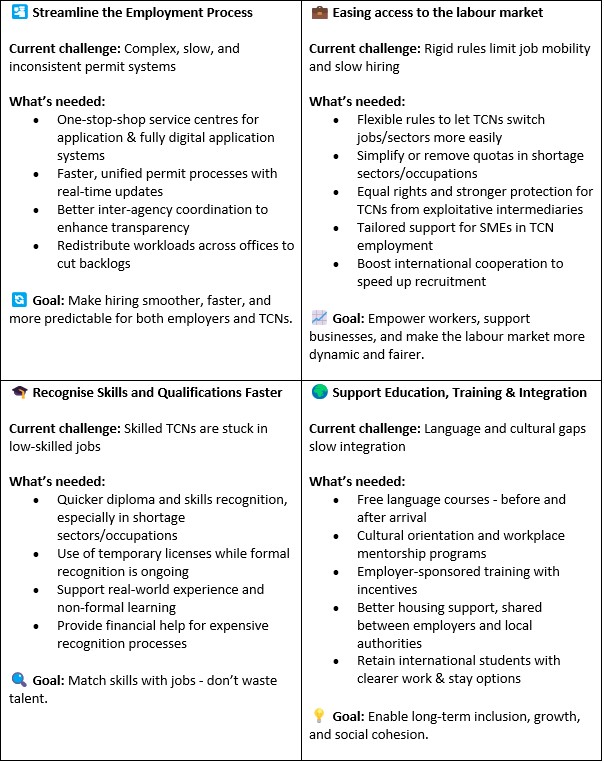After two years of intensive research and international cooperation, we are concluding the Recruit4Tomorrow project with a clear message: the recruitment of workers from third countries in EU Member States is no longer a question of the future - it is already a daily reality that requires a systemic, inclusive and long-term approach.
At the end of the project "Recruit4Tomorrow - Encouraging employment of third-country nationals through social dialogue", the project partners issue a press release to inform of the results of the research project and to raise public awareness of the issues of employment of third-country nationals and the findings.
The two-year research project intertwined both general information and dissemination activities as well as concrete research and educational activities. At the beginning of the project, we conducted desk research in all five partner countries (Slovenia, Slovakia, Hungary, Bulgaria and Croatia), which gave us an in-depth insight into the current employment situation of third-country nationals in all partner countries. This was further explored by the implementation of focus groups (one focus group was held in each country), where we investigated the original findings in more detail, and in the last phase of the research work, we conducted a quantitative survey on a sample of more than 500 companies in all five countries that participated in the project.
Research results have shown that the employment of third-country nationals has become an essential element of the labour market strategy. To fill the gap in the necessary workforce, companies are employing more and more third-country nationals, facing a number of challenges in doing so. The findings of the research phase revealed:
- Labour shortages are forcing economies to find solutions beyond national borders. The need for faster, more transparent and digitalised recruitment procedures for third-country nationals has been expressed in all participating countries, to reduce unnecessary bureaucracy and shorten procedures.
- The disconnection of institutions and complex bureaucratic procedures leads to uncertainty and inefficiency. Employers are calling for greater coordination between ministries, administrative units and employment services.
- The integration and assimilation of foreign workers remain weak points. The lack of systemic solutions and the absence of a clear division of responsibilities between the state and employers often lead to social exclusion. Without comprehensive approaches, there is a risk of creating closed communities.
- Trade unions are often less active than employers in the field of employment of third-country nationals, mainly due to the short-term nature of employment and the lack of interest of foreign workers in membership. However, where they are active, they make an important contribution to the protection of the rights and dignity of all workers.
- Exploitation, cultural friction and language barriers remain pressing problems that are under-addressed by current policies. In some cases, practices are emerging that lead to a sense of second-class feeling for the domestic workers.
- A change in narrative is needed. The countries of origin of foreign workers are not only a source of labour, but an opportunity for economic growth, greater diversity and long-term stability of European labour markets.
The project also made recommendations to improve the recruitment process for third-country nationals, which are cross-border and thus apply to all participating countries and can also help other countries that are facing the challenge of employing third-country nationals. These recommendations include:

|
|
Co-Funded by the European Union. This document has been produced in the context of the Recruit4Tomorrow project. Views and opinions expressed are however those of the author(s) only and do not necessarily reflect those of the European Union or European Commission. Neither the European Union nor the granting authority can be held responsible for them. |
|
|
Project is co-financed by the Government Office for Cooperation with NGOs. The views expressed in this publication are the sole responsibility of Recruit4Tomorrow consortia and do not necessarily reflect the opinion of the Government Office for Cooperation with NGOs. |








